More than 90 arrests made after far-right demonstrations turn violent
More than 90 people were arrested after far-right demonstrations descended into riots in towns and cities across the UK on Saturday.
Bottles were thrown, shops looted, and police officers attacked in areas including Hull, Liverpool, Bristol, Manchester, Blackpool and Belfast – but not all demonstrations turned violent.
The prime minister has pledged to give police forces the government’s “full support” to take action against “extremists” attempting to “sow hate”.
Tensions have been high after the killing of three young girls at a Taylor Swift-themed dance party in Southport, Merseyside, on Monday.

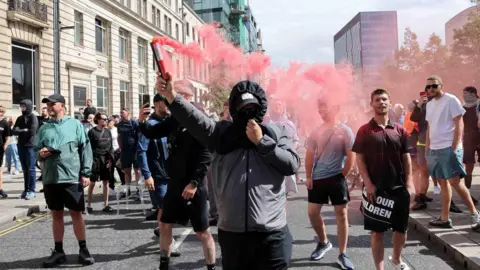 Reuters
Reuters
In Liverpool, bricks, bottles and a flare were thrown at police, one officer was hit in the head when a chair was thrown, and another was kicked and knocked off his motorbike.
A few hundred anti-fascist demonstrators gathered across from Liverpool’s Lime Street station at lunchtime, calling for unity and tolerance, chanting “refugees are welcome here” and “Nazi scum, off our streets”.
They marched down to the city’s riverside to confront around one thousand anti-immigration protestors – some of whom were shouting Islamophobic slurs.
Police in riot gear with dogs struggled to keep the two sides apart and reinforcements were called to try and maintain order.
The unrest continued into the early hours of Sunday morning, with fireworks launched towards police officers wearing riot gear.
A library was set on fire in the Walton area of the city and rioters tried to prevent firefighters from putting it out, Merseyside Police said.
Shops were broken into and a number of wheelie bins were set on fire, it added.
The force confirmed a number of officers had been injured in what they described as “serious disorder”, adding that two had been taken to hospital – one with a suspected broken nose and one with a suspected broken jaw.
It said 23 people had been arrested.
Assistant Chief Constable Jenny Simms said: “The disorder, violence and destruction has no place here in Merseyside, least of all after the tragic events that took place in Southport on Monday”.
“Those who engaged in this behaviour bring nothing but shame to themselves and this city. “
At a meeting of government ministers earlier on Saturday, a spokesperson for Sir Keir Starmer said the PM told those assembled that “the right to freedom of expression and the violent disorder we have seen are two very different things.”
He added: “there is no excuse for violence of any kind and reiterated that the government backs the police to take all necessary action to keep our streets safe”.
On Saturday, the home secretary also warned that anyone engaging in “unacceptable disorder” would face imprisonment and travel bans amongst other punishments, adding that “sufficient” prison places had been made available.
“Criminal violence and disorder has no place on Britain’s streets,” Yvette Cooper said.
Police have the government’s full backing in taking action against those engaging in “thuggery”, she added.

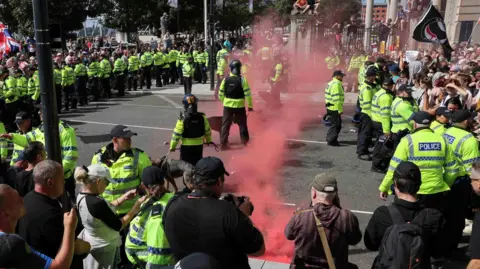 PA
PA
In Bristol, protesters and counter-protests were engaged in a standoff.
One group could be heard singing Rule Britannia, “England ’til I die” and “we want our country back”, while the other side chanted “refugees are welcome here”.
Beer cans were thrown at the anti-racism group, and some of the rival protesters were baton-charged by officers.
Avon and Somerset Police said 14 people in the city had been arrested, with Chief Inspector Vicks Hayward-Melen anticipating there would be “further arrests over the coming days”.
In Manchester, there were scuffles with police, and at least two arrests.
While in Belfast, two people were arrested as protesters outside a mosque threw objects at members of the media and earlier smashed windows in a cafe.

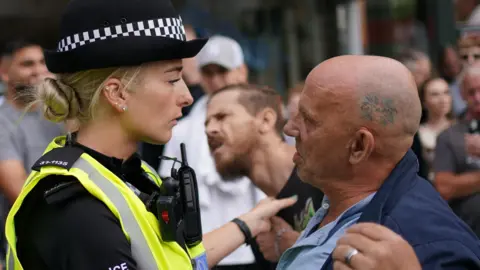 PA
PA

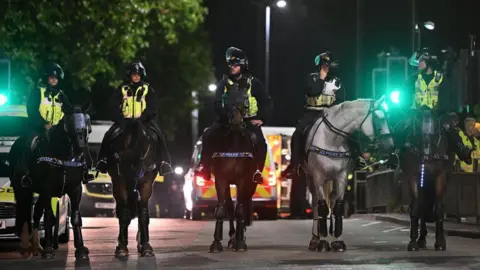 Justin Tallis / AFP
Justin Tallis / AFP
In Hull, protesters smashed a window at a hotel used to house asylum seekers, and bottles and eggs were thrown at police.
City Hall was placed on lockdown as the British Chess Championships took place inside.
Humberside Police said three police officers had been injured and 20 people arrested after disorder in the city centre also saw shops ransacked and items set on fire.

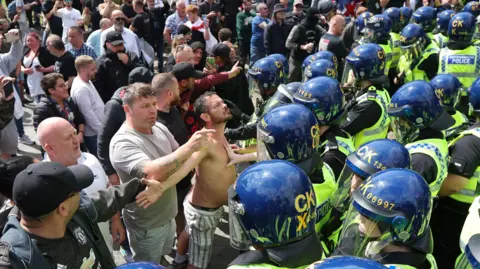 Shutterstock
Shutterstock

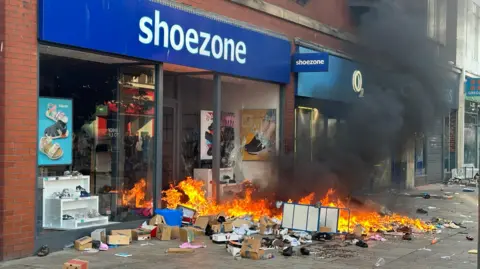 Leanne Brown / BBC
Leanne Brown / BBC
In Blackpool, protesters faced off against punks attending Rebellion Festival. There was little police presence as skirmishes broke out between the two groups, with bottles and chairs thrown.
Lancashire Police said it had arrested more than 20 people. The force said its focus had been on Blackpool but there had also been “minor disruption” in Blackburn and Preston.
In Stoke-on-Trent, bricks were thrown at officers. Staffordshire Police said that two men at the centre of online claims they had been stabbed had actually been hit by an object that was thrown, and were not seriously injured.
The force said 10 people had been arrested and three officers suffered minor injuries.
Elsewhere Leicestershire Police arrested two people in Leicester city centre. And West Yorkshire Police said a protest on the Headrow in Leeds “passed off largely without incident”, despite one arrest being made.
Not all demonstrations held across the UK descended into violence on Saturday, and in some places protesters dispersed by the evening.
Saturday’s protests follow a night of violence in Sunderland on Friday, which saw four police officers hospitalised.
Hundreds of people rioted, beer cans and bricks were thrown at riot police outside a mosque and a Citizens Advice office was torched.
Twelve people have been arrested in connection with the violence.
The BBC has identified at least 30 demonstrations being planned by far-right activists around the UK over the weekend, including a new protest in Southport.
An extra 70 prosecutors are on standby this weekend to charge people arrested in connection with violent disorder.
Shadow home secretary James Cleverly called on Sir Keir and the home secretary to “do more” to restore public order and “send a clear message to the thugs”.
Earlier this week, the prime minister announced a new national violent disorder programme to help clamp down on violent groups by allowing police forces to share intelligence.
With additional reporting by BBC News reporters across England.








